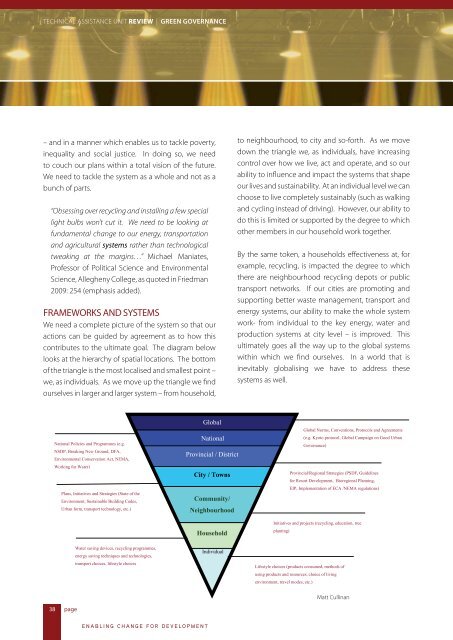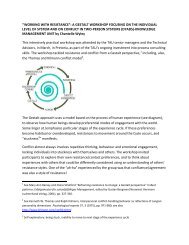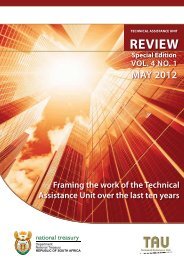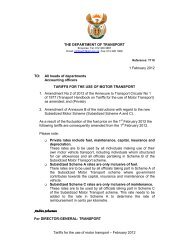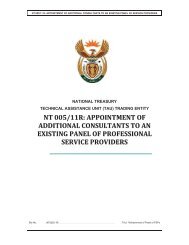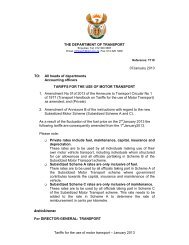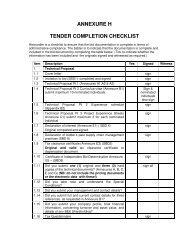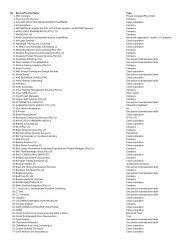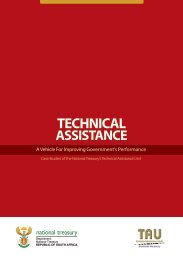Review 3 final 2 - TAU - National Treasury
Review 3 final 2 - TAU - National Treasury
Review 3 final 2 - TAU - National Treasury
Create successful ePaper yourself
Turn your PDF publications into a flip-book with our unique Google optimized e-Paper software.
TECHNICAL ASSISTANCE UNIT REVIEW | Green Governance<br />
– and in a manner which enables us to tackle poverty,<br />
inequality and social justice. In doing so, we need<br />
to couch our plans within a total vision of the future.<br />
We need to tackle the system as a whole and not as a<br />
bunch of parts.<br />
“Obsessing over recycling and installing a few special<br />
light bulbs won’t cut it. We need to be looking at<br />
fundamental change to our energy, transportation<br />
and agricultural systems rather than technological<br />
tweaking at the margins…” Michael Maniates,<br />
Professor of Political Science and Environmental<br />
Science, Allegheny College, as quoted in Friedman<br />
2009: 254 (emphasis added).<br />
FRAMEWORKS AND SYSTEMS<br />
We need a complete picture of the system so that our<br />
actions can be guided by agreement as to how this<br />
contributes to the ultimate goal. The diagram below<br />
looks at the hierarchy of spatial locations. The bottom<br />
of the triangle is the most localised and smallest point –<br />
we, as individuals. As we move up the triangle we find<br />
ourselves in larger and larger system – from household,<br />
to neighbourhood, to city and so-forth. As we move<br />
down the triangle we, as individuals, have increasing<br />
control over how we live, act and operate, and so our<br />
ability to influence and impact the systems that shape<br />
our lives and sustainability. At an individual level we can<br />
choose to live completely sustainably (such as walking<br />
and cycling instead of driving). However, our ability to<br />
do this is limited or supported by the degree to which<br />
other members in our household work together.<br />
By the same token, a households effectiveness at, for<br />
example, recycling, is impacted the degree to which<br />
there are neighbourhood recycling depots or public<br />
transport networks. If our cities are promoting and<br />
supporting better waste management, transport and<br />
energy systems, our ability to make the whole system<br />
work- from individual to the key energy, water and<br />
production systems at city level – is improved. This<br />
ultimately goes all the way up to the global systems<br />
within which we find ourselves. In a world that is<br />
inevitably globalising we have to address these<br />
systems as well.<br />
<strong>National</strong> Policies and Programmes (e.g.<br />
NSDP, Breaking New Ground, DFA,<br />
Environmental Conservation Act, NEMA,<br />
Working for Water)<br />
Plans, Initiatives and Strategies (State of the<br />
Environment, Sustainable Building Codes,<br />
Urban form, transport technology, etc.)<br />
Global<br />
<strong>National</strong><br />
Provincial / District<br />
City / Towns<br />
Community/<br />
Neighbourhood<br />
Household<br />
Global Norms, Conventions, Protocols and Agreements<br />
(e.g. Kyoto protocol, Global Campaign on Good Urban<br />
Governance)<br />
Provincial/Regional Strategies (PSDF, Guidelines<br />
for Resort Development, Bioregional Planning,<br />
EIP, Implementation of ECA /NEMA regulations)<br />
Initiatives and projects (recycling, education, tree<br />
planting)<br />
Water saving devices, recycling programmes,<br />
energy saving techniques and technologies,<br />
transport choices, lifestyle choices<br />
Individual<br />
Lifestyle choices (products consumed, methods of<br />
using products and resources, choice of living<br />
environment, travel modes, etc.)<br />
Matt Cullinan<br />
38<br />
page<br />
Enabling change for development


